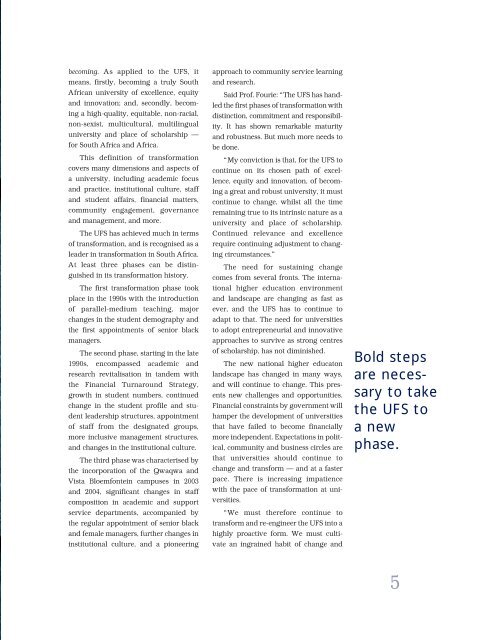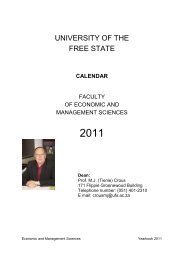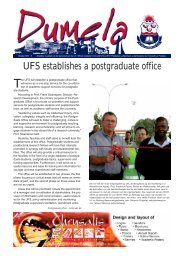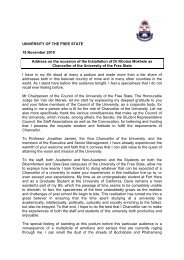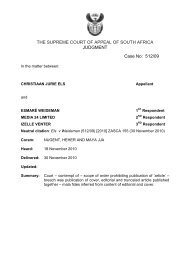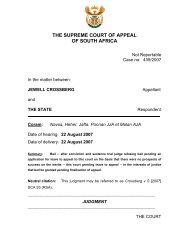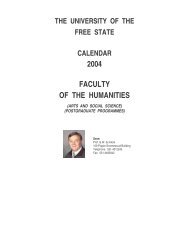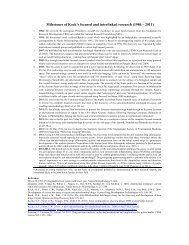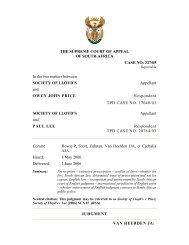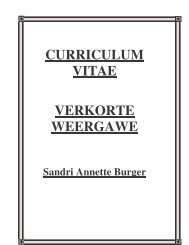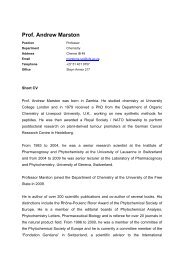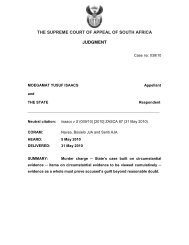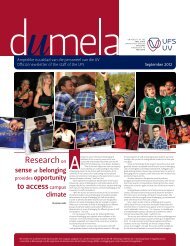Jaaroorsig - University of the Free State
Jaaroorsig - University of the Free State
Jaaroorsig - University of the Free State
You also want an ePaper? Increase the reach of your titles
YUMPU automatically turns print PDFs into web optimized ePapers that Google loves.
ecoming. As applied to <strong>the</strong> UFS, itmeans, firstly, becoming a truly SouthAfrican university <strong>of</strong> excellence, equityand innovation; and, secondly, becominga high-quality, equitable, non-racial,non-sexist, multicultural, multilingualuniversity and place <strong>of</strong> scholarship —for South Africa and Africa.This definition <strong>of</strong> transformationcovers many dimensions and aspects <strong>of</strong>a university, including academic focusand practice, institutional culture, staffand student affairs, financial matters,community engagement, governanceand management, and more.The UFS has achieved much in terms<strong>of</strong> transformation, and is recognised as aleader in transformation in South Africa.At least three phases can be distinguishedin its transformation history.The first transformation phase tookplace in <strong>the</strong> 1990s with <strong>the</strong> introduction<strong>of</strong> parallel-medium teaching, majorchanges in <strong>the</strong> student demography and<strong>the</strong> first appointments <strong>of</strong> senior blackmanagers.The second phase, starting in <strong>the</strong> late1990s, encompassed academic andresearch revitalisation in tandem with<strong>the</strong> Financial Turnaround Strategy,growth in student numbers, continuedchange in <strong>the</strong> student pr<strong>of</strong>ile and studentleadership structures, appointment<strong>of</strong> staff from <strong>the</strong> designated groups,more inclusive management structures,and changes in <strong>the</strong> institutional culture.The third phase was characterised by<strong>the</strong> incorporation <strong>of</strong> <strong>the</strong> Qwaqwa andVista Bloemfontein campuses in 2003and 2004, significant changes in staffcomposition in academic and supportservice departments, accompanied by<strong>the</strong> regular appointment <strong>of</strong> senior blackand female managers, fur<strong>the</strong>r changes ininstitutional culture, and a pioneeringapproach to community service learningand research.Said Pr<strong>of</strong>. Fourie: “The UFS has handled<strong>the</strong> first phases <strong>of</strong> transformation withdistinction, commitment and responsibility.It has shown remarkable maturityand robustness. But much more needs tobe done.“My conviction is that, for <strong>the</strong> UFS tocontinue on its chosen path <strong>of</strong> excellence,equity and innovation, <strong>of</strong> becominga great and robust university, it mustcontinue to change, whilst all <strong>the</strong> timeremaining true to its intrinsic nature as auniversity and place <strong>of</strong> scholarship.Continued relevance and excellencerequire continuing adjustment to changingcircumstances.”The need for sustaining changecomes from several fronts. The internationalhigher education environmentand landscape are changing as fast asever, and <strong>the</strong> UFS has to continue toadapt to that. The need for universitiesto adopt entrepreneurial and innovativeapproaches to survive as strong centres<strong>of</strong> scholarship, has not diminished.The new national higher educatonlandscape has changed in many ways,and will continue to change. This presentsnew challenges and opportunities.Financial constraints by government willhamper <strong>the</strong> development <strong>of</strong> universitiesthat have failed to become financiallymore independent. Expectations in political,community and business circles arethat universities should continue tochange and transform — and at a fasterpace. There is increasing impatiencewith <strong>the</strong> pace <strong>of</strong> transformation at universities.“We must <strong>the</strong>refore continue totransform and re-engineer <strong>the</strong> UFS into ahighly proactive form. We must cultivatean ingrained habit <strong>of</strong> change andBold stepsare necessaryto take<strong>the</strong> UFS toa newphase.5


